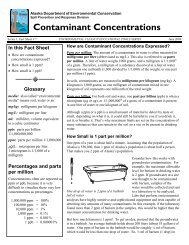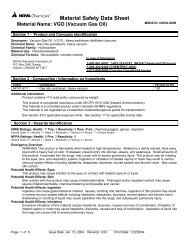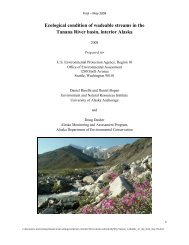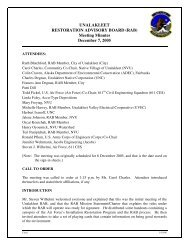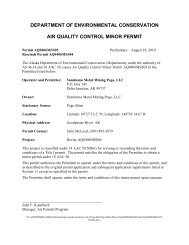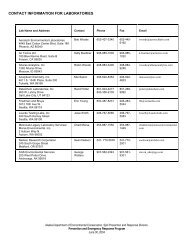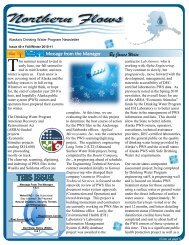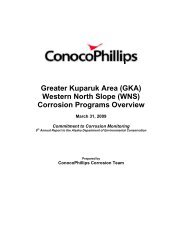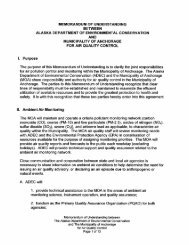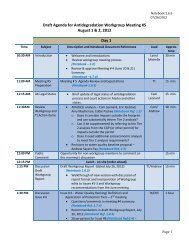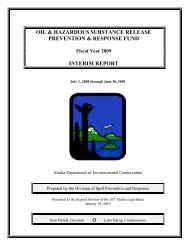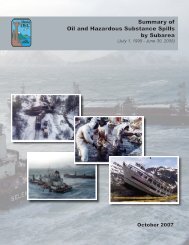2012 Ocean Ranger Guidebook Revision 3-7-12 - Alaska ...
2012 Ocean Ranger Guidebook Revision 3-7-12 - Alaska ...
2012 Ocean Ranger Guidebook Revision 3-7-12 - Alaska ...
You also want an ePaper? Increase the reach of your titles
YUMPU automatically turns print PDFs into web optimized ePapers that Google loves.
<strong>20<strong>12</strong></strong> <strong>Ocean</strong> <strong>Ranger</strong> <strong>Guidebook</strong> 3-7-<strong>12</strong><br />
Discussion<br />
Just as on shore, ship operations and passengers generate waste as part of many daily<br />
activities. On ships, waste is generated while underway and in port. Because ships move, the<br />
management of these wastes becomes more complicated than for land-based activities, as the<br />
facilities and laws change with the location of the ship. Facilities on the ships as well as<br />
management practices must be designed to take into account environmental laws and regulations<br />
around the world and the various local and state laws and regulations. Moreover, because waste<br />
management ultimately becomes a local activity, the local port infrastructure, service providers,<br />
and local waste disposal vendors are factors in the decision-making processes.<br />
On an international level, environmental processes are an important part of the<br />
International Maritime Organization’s (IMO’s) policies and procedures for the maritime industry.<br />
CLIA member lines have agreed to incorporate environmental performance into Safety<br />
Management Systems (SMS) and MARPOL mandated Waste Management Manuals. Under<br />
agreements and laws specific to many nations, these programs are routinely reviewed by Port<br />
States to ensure compliance. For example, in the United States, the US Coast Guard has<br />
jurisdiction over environmental matters in ports and waterways and conducts passenger ship<br />
examinations that include review of environmental systems, SMS documentation and such<br />
MARPOL-mandated documents as the Oil Record Book and the Garbage Record Book. Within<br />
the United States, environmental laws and regulations apply include the Clean Water Act, the<br />
Refuse Disposal Act, the Resource Conservation and Recovery Act, The Clean Air Act, the Oil<br />
Pollution Act of 1990, and the Pollution Prevention Act, to name a few, which apply to all ships<br />
within U.S. waters.<br />
The industry effort to develop waste management practices and procedures has focused<br />
on the traditional high volume wastes (garbage, graywater, blackwater, oily residues (sludge oil)<br />
and bilge water), pollution prevention, and the small quantities of hazardous waste produced<br />
onboard. In the process, CLIA members have shared waste management strategies and<br />
technologies, while focusing on a common goal of waste reduction.<br />
The process of waste reduction includes waste prevention, the purchasing of products that<br />
have recycled content or produce less waste (e.g. source reduction), incineration, and recycling or<br />
reuse of wastes that are generated. The ultimate goal is to have the waste management culture<br />
absorbed into every facet of cruise vessel operation. A fully integrated system beginning with<br />
the design of the vessel should address environmental issues at every step.<br />
Management practices for waste reduction should start before a product is selected. Ecopurchasing<br />
and packaging are vital to the success of any environmental program, as are strategies<br />
to change packaging, processes and management to optimize the resources used.<br />
The commitment of the industry to this cooperative effort has been quite successful, as<br />
companies have shared information and strategies.<br />
Industry Standard Waste Handling Procedures<br />
CLIA member lines have agreed that hazardous wastes and waste streams onboard cruise<br />
vessels will be identified and segregated for individual handling and management in accordance<br />
with appropriate laws and regulations. They have further agreed, hazardous wastes will not be<br />
discharged overboard, nor be commingled or mixed with other waste streams.<br />
135



